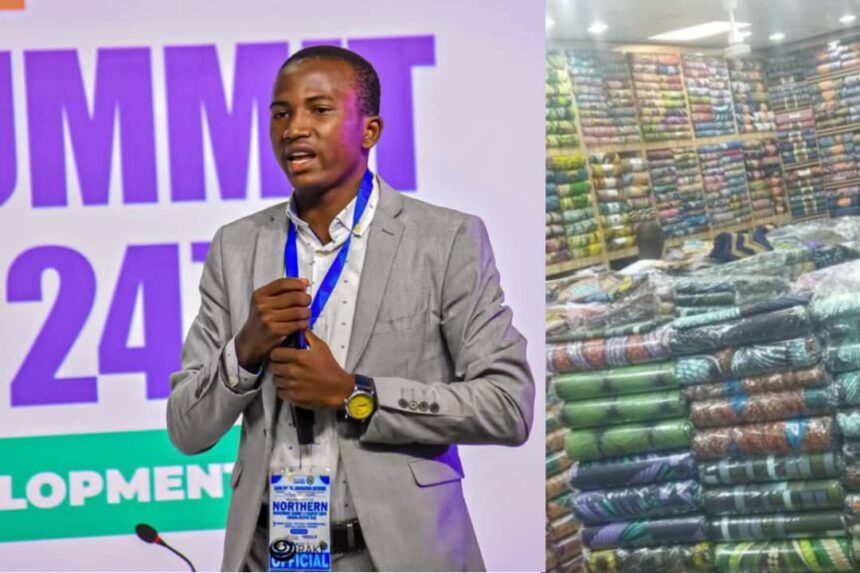In the bustling heart of Kano, where rolls of Ankara and lace fabrics colour the ancient Kwari Market, a quiet revolution is taking shape. For decades, Nigeria’s textile traders have thrived in physical stalls, bartering, bargaining, and building trust face-to-face.
But here is a new world moving rapidly toward digital commerce, and this reliance on traditional methods has left many behind.
With limited online access, poor logistics coordination, and mistrust of digital payments, thousands of vendors struggle to reach customers beyond their market stalls.
These long-standing pain points, inefficiency, opacity, and limited reach, have not only stunted business growth but also denied Africa’s textile capital its deserved place in the digital economy.
In this edition of Techparley’s Drive100, where we spotlight Africa’s most promising startups transforming industries, we turn our lens to Kwari E-Market, the Nigerian startup building the continent’s first digitized textile marketplace, designed to bring visibility, transparency, and efficiency to Africa’s age-old fabric trade.
Digitizing Trust in the Textile Market
Kwari E-Market, founded by Kassim Muhammad Atiku, seeks to bridge one of the most persistent divides in African trade, the gap between physical commerce and digital trust.
Built specifically for Nigeria’s textile industry, Kwari offers vendors a platform to list their fabrics online, connect with verified buyers, and process transactions securely without fear of fraud or loss.
Atiku, who spent five years studying the operational and behavioural patterns of traders in Kano’s fabric markets, understood that simply building an app was not enough, the technology had to reflect the culture of trade itself.
“Our goal is to digitalize traditional market systems without losing the human trust that drives them,” Atiku explains. “We’re building technology that understands the people it serves.”
Through a blend of AI, vendor verification, and logistics integration, Kwari is creating a platform that mirrors the structure of traditional markets, but with the speed, reach, and accountability of a modern digital ecosystem.
How Kwari Works
At its core, Kwari E-Market simplifies how textile businesses operate, from listing to payment to delivery. Vendors can register and verify their businesses, showcase products, and manage inventory via a custom dashboard.
Buyers, on the other hand, can browse authentic listings, place orders confidently, and track deliveries in real time.
The startup’s standout features include:
- Verified Vendor Profiles ensuring only legitimate traders list on the platform.
- Secure Payment Integration that protects both vendors and buyers.
- Real-Time Order Tracking powered by logistics partnerships for reliable delivery.
- Vendor Dashboard that helps sellers manage their business efficiently.
- Rating and Review Systems fostering transparency and accountability.
This structure doesn’t just simplify trade, it transforms it into a data-driven experience that boosts vendor visibility, reduces fraud, and promotes financial inclusion among small-scale traders.
A Marketplace Rooted in Culture, Driven by Data
Unlike Jumia, Konga, or Facebook Marketplace, Kwari is purpose-built for Nigeria’s fabric economy, an industry that relies heavily on personal relationships, visual inspection, and local credibility. The platform’s design reflects this cultural nuance.
From language localization to trust verification, Kwari integrates market-specific realities such as agent systems, delivery coordination, and dispute mediation.
This deliberate alignment between technology and tradition is what differentiates it from other e-commerce platforms.
“Kwari isn’t just another online store,” Atiku emphasizes. “It’s a digital extension of the market, one that understands how we buy, sell, and build trust.”
The startup’s unique value proposition lies in transforming centuries-old trade habits into digital opportunities, empowering small traders to access broader markets while preserving the authenticity of their craft.
Progress So Far
Although still in its pre-launch phase, Kwari E-Market has already made impressive progress. The team has completed its prototype development, vendor verification system, and logistics framework, establishing a strong operational foundation before going public.
Key achievements include:
- Conducting a five-year market study involving 1,300+ traders and buyers.
- Completing Kwari 1.0 prototype testing.
- Securing early partnerships with logistics providers.
- Developing comprehensive privacy, return, and payment policies.
- Garnering interest from hundreds of vendors across northern Nigeria awaiting onboarding.
This groundwork places Kwari in a strong position to become the first fully digitized textile trading ecosystem in West Africa.
Meeting the Team Behind Kwari
Every digital revolution begins with a team that sees possibility where others see barriers.
At Kwari, that team is led by Kassim Muhammad Atiku, a strategist and researcher with deep ties to Nigeria’s textile sector. His firsthand understanding of traders’ pain points shaped the startup’s cultural and technical DNA.
Supporting him is Ridwan Salman, the Chief Technology Officer, who leads the product’s architecture and ensures system scalability and security.
Ganiyu A., Head of Operations, coordinates vendor onboarding and logistics activities, ensuring that Kwari’s physical market integration runs smoothly.
Designing the platform’s visual and user experience are Muhammad Inuwa, Senior Web Designer, and Babarinde Abdrohim, UI/UX Designer, both responsible for creating a culturally inclusive and intuitive digital interface.
Together, they form a multidisciplinary team capable of merging local insight with global technology standards, the hallmark of every sustainable African startup story.
Challenges and the Road Ahead
Like many early-stage startups in Africa, Kwari faces structural challenges, particularly around funding, vendor trust, and logistics reliability.
Many traditional traders remain skeptical of digital systems. To counter this, Kwari conducts in-person training, live demonstrations, and community outreach to build confidence.
Logistics, another persistent barrier, is being addressed through verified courier partnerships and an in-built order tracking feature designed to ensure delivery transparency.
Despite these hurdles, the team remains resolute.
“We’re not just building a product,” Atiku says. “We’re building belief, belief that Africa’s oldest markets can thrive in a digital future.”
The Future of Kwari E-Market
In the next 12 months, Kwari aims to launch full operations, onboard over 10,000 vendors and 50,000 buyers, and expand across major northern cities including Kano, Kaduna, and Abuja.
By 2027, the startup plans to integrate AI analytics for fraud detection and inventory intelligence, launch Kwari Business Accounts for SMEs, and establish itself as West Africa’s largest digital textile network.
Ultimately, the team envisions Kwari Global, a cross-border marketplace connecting African fabric traders to international buyers and transforming Nigeria’s textile heritage into a global export force.
Talking Points
Kwari E-Market presents a thoughtful and culturally grounded approach to solving Nigeria’s long-standing challenges in the textile trade, but its success will hinge on execution rather than vision.
The idea of digitizing trust and trade in such a deeply traditional market is ambitious and admirable, yet it also faces steep adoption barriers among vendors with limited digital literacy and ingrained skepticism toward online platforms.
While the team’s deep local insight and early groundwork offer a solid foundation, questions remain around scalability, logistics reliability, and how the startup plans to sustain user engagement in an environment dominated by established e-commerce players.
If Kwari can strike the right balance between technological sophistication and grassroots simplicity, without losing sight of affordability and vendor education, it could evolve from a niche innovation into a pivotal model for digital inclusion across Africa’s informal economies.
______________________
Bookmark Techparley.com for the most insightful technology news from the African continent.
Follow us on X/Twitter @Techparleynews, on Facebook at Techparley Africa, on LinkedIn at Techparley Africa, or on Instagram at Techparleynews






